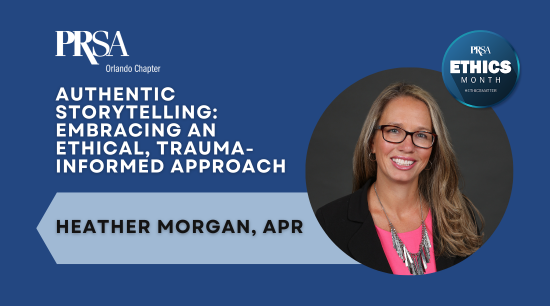Authentic Storytelling: Embracing an Ethical, Trauma-Informed Approach
By Heather Morgan, APR
Vice President of Communications, MHP Salud
Ethics Officers Outreach Chair, PRSA Board of Ethics and Professional Standards
It’s not a secret: powerful stories demonstrate impact, influence policy and funding, and ignite change. Authentic stories matter… and so does the approach. That’s why ethical, trauma-informed storytelling is critical.
While important in all industries, it’s imperative in nonprofit, health and other sensitive fields when we’re asking people to share one of the most difficult, emotional times of their lives. Perhaps it’s a single mom confiding her fears when she learned she had cancer. Or a teenager recalling the gunshots outside his window. These lived experiences bring your mission to life – but, as PR pros, we have an ethical responsibility to approach each one with a trauma-informed lens and commitment.
What does that look like?
In simple terms, it’s giving the subject of the story – client, donor, employee… whomever it is – ownership of their story. They are the expert in their own lived experience; we merely had the opportunity to be part of it. Trauma-informed storytelling encompasses the entire process – collecting, sharing and honoring stories. A few key points to consider:
Consent: This entails more than signing a release. It’s truly talking with the individual, gauging their comfort levels and honoring their wishes in how they want to share. It’s the beginning of building trust necessary to tell the story.
Boundaries: Always respect boundaries and sensitive information. Never pressure someone to share, and never disclose anything that could compromise their safety or well-being.
Prevent Re-Traumatization: Never risk re-traumatizing someone by violating their trust in how you share their story or by causing them to feel loss of control over their narrative. And do your prep work – have open, honest communication with your internal partners who directly serve the one you’re featuring so you know ahead of time what topics or red flags to avoid.
Offer Support: Always allow the storyteller to have a support system when they share their story, whether it’s a conversation with you or a presentation in front of a crowd.
Relinquish Ownership: This is not your story to own – ensure your storyteller has the opportunity to review any stories – written, recorded or otherwise – before releasing to the public. This is their story.
Always Say “Thank You”: Steward your storyteller as you would a donor or client. Share your appreciation, share the impact of their courage, and keep the door open for future opportunities.
Though this barely covers the surface of ethical, trauma-informed storytelling, it offers a foundation for practitioners ready to explore this approach.
And at the heart of it all, let’s remember how this approach aligns with our responsibility as PR pros – in following PRSA’s Code of Ethics, one of our core Values is Advocacy: We serve the public interest by acting as responsible advocates for those we represent. At the core, we represent those we serve. That means we don’t exploit their experience, we don’t share their pain for our gain. We honor their authenticity, integrity and courage. We let them own their story.
When you explore the Code – Values and Provisions of Conduct – it’s easy to connect the dots between ethics and trauma-informed storytelling.
As we’re in the middle of Ethics Month – and, for nonprofits, about to jump into the heavy fundraising season – let’s not forget our deep responsibility to be the advocates for those we serve. Let’s remember our responsibility to build trust – with those we serve, with those we hope to influence, with the public.
At the heart of PR, at the heart of the Code, and at the heart of relationships, it’s about building trust. And trust comes with honesty and authenticity – cornerstones of a trauma-informed approach.



